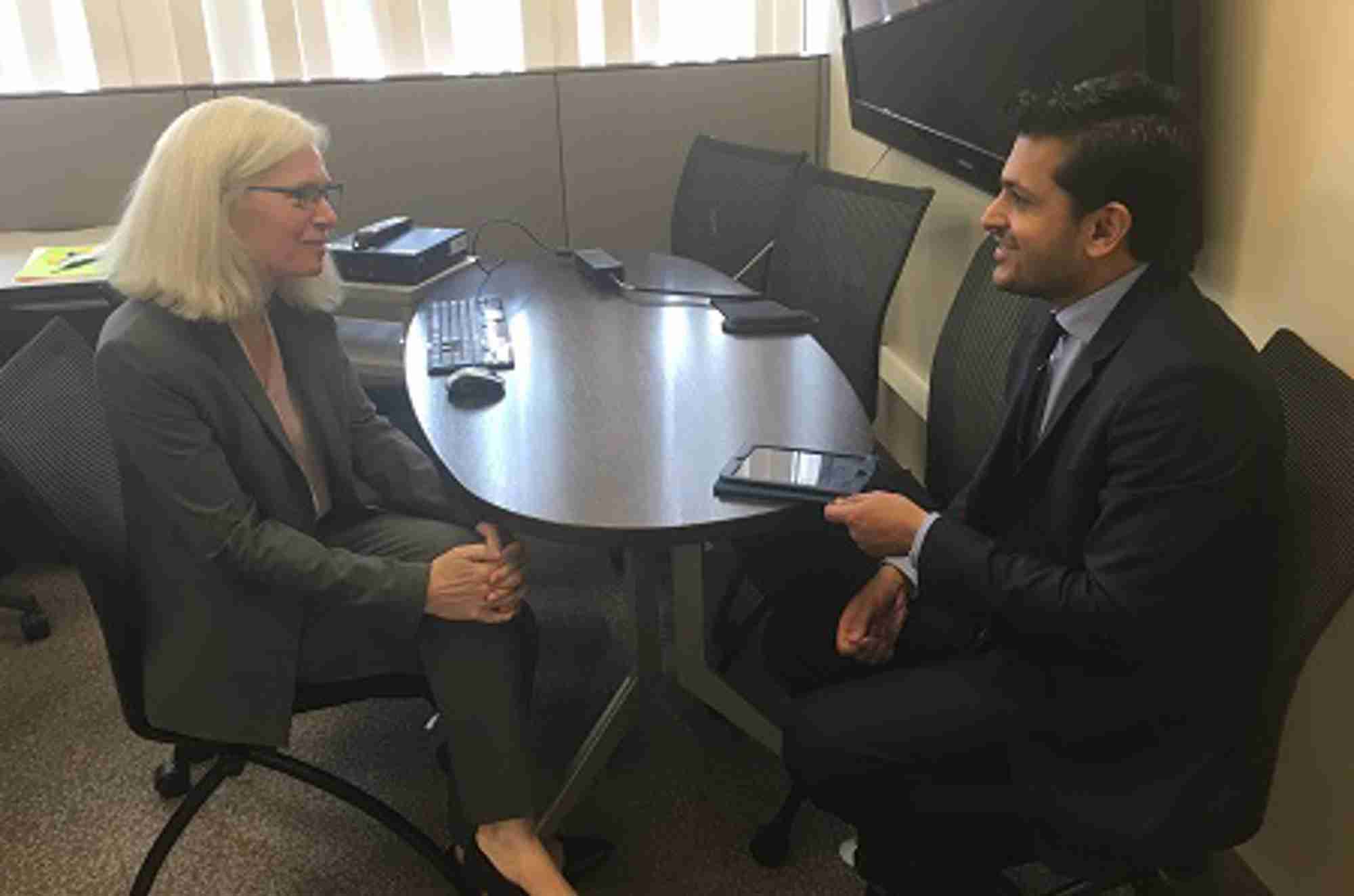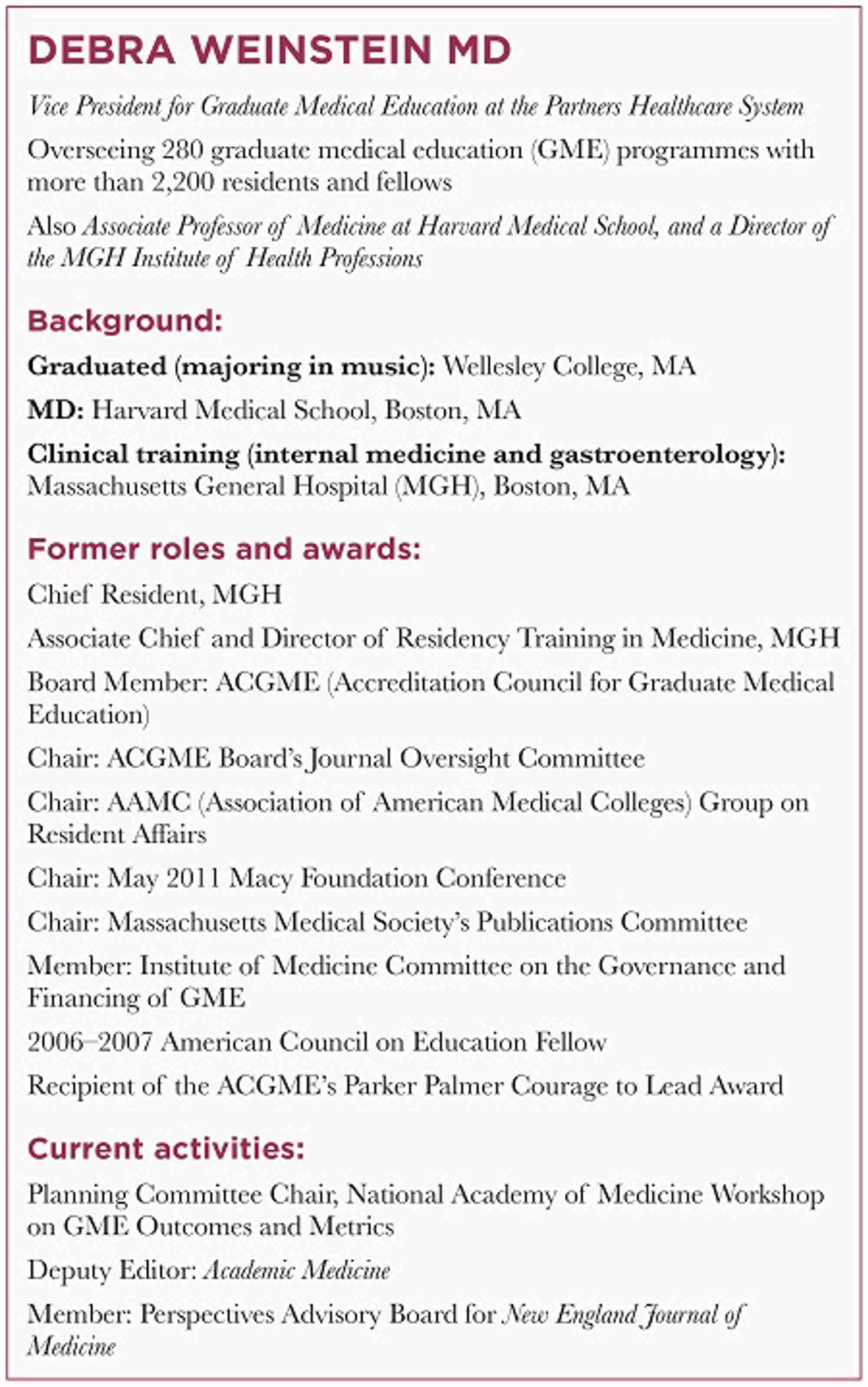Debra Weinstein is in charge of graduate medical education across Partners Healthcare, which includes two of the most prestigious hospitals in the world: Massachusetts General and Brigham and Women’s. During a recent trip to Harvard Medical School, Amir Sam spoke with her about postgraduate education in the USA.
Could you briefly explain the postgraduate medical training pathway in the USA?
Following graduation from medical school, US physicians pursue graduate medical education (GME), which is required for licensure. GME includes residency training in a specialty of medicine, and may be followed by fellowship training in a subspecialty. The residency programmes range from 3 years in internal medicine to 7 years in neurosurgery, for example. Fellowships can last anywhere from 1 to 4 or more years, longer for those who are anticipating an academic career and want to get research training. Specialty Board Certification exams are taken after completion of residency, and many subspecialties have certification exams following fellowship training.
Are there formative opportunities for trainees to receive feedback before they take the Board exams?
Yes, many specialties have nationally standardised ‘in-service’ exams that are undertaken during residency. These provide residents with a sense of where they are, and also allow programmes to identify if their residents are not doing as well as they should in certain areas. Of course, this supplements routine feedback provided in the clinical setting.
'I think over the next 10–20 years we will develop substantially improved assessment tools and methods, supported by an expanding evidence base'
How do you select your trainees?
Each specialty programme has their own selection committee, and they establish their own criteria. Usually, the initial selection of candidates for interviews is based on academic criteria, letters of recommendation and other relevant experience and credentials (such as research, community service, etc.).
How are assessments and appraisals performed?
This is an area of great interest and importance for medical education in the USA and elsewhere. In my role as Deputy Editor of the journal Academic Medicine, it’s gratifying to see a large volume of scholarship focused on this topic. Increasing attention is being paid to competency-based, rather than time-based, education, which of course relies on valid and reliable assessments. I think over the next 10–20 years we will develop substantially improved assessment tools and methods, supported by an expanding evidence base.
How many hours a week on average does a resident in internal medicine work?
We have duty hours limits determined by the ACGME (Accreditation Council for Graduate Medical Education), and since 2003 there have been limits that apply across all specialties. The maximum is 80 hours a week, averaged over four weeks. There are also requirements relating to shift length, the frequency of nights on call, and minimum breaks between shifts. Programmes and institutions are responsible for monitoring duty hours and addressing areas of non-compliance.
What would the reaction be if the weekly hours were reduced to 48, for example?
A lot of people oppose the 80-hour limit based on concerns about providing sufficient education and on the unintended consequences of an ‘unfunded mandate’. I think there would be a huge uproar if 48 hours were proposed in the USA.
What is the average salary for a resident in internal medicine?
Salaries are established by each teaching institution, but tend to be similar across hospitals, especially within a given region. In our institutions (and I think this is true generally across the USA) the salary is based on an individual’s year in training, not their specialty. In Boston, salaries currently start at about $60,000 a year for interns (i.e. the first year out of medical school), and increase by a few thousand each year. The majority of residents carry large burdens of educational debt and many, if allowed by their programme, identify clinical moonlighting opportunities towards the end of their residencies.
In the UK, trainees rotate across a number of hospitals. How often do junior doctors rotate in the USA?
That varies by programme. At Massachusetts General, internal medicine residents spend most of the time at that hospital. However, the residents do rotate to our affiliated community hospitals for community hospital experience, and many have their continuity clinic practices in community-based settings.
In the UK, the emphasis is moving towards community-centred care provision, but most training is still delivered in hospitals. How does that compare with the USA?
Over time, there has been a distinct movement towards more emphasis on ambulatory training, though some groups recommend that a greater proportion of the training should take place in the ambulatory setting. The teaching hospitals that generally sponsor and design the programmes have come to rely on residents’ contribution to patient care delivery, and our federal system of reimbursement tends to perpetuate the status quo. Many hospitals offer primary care tracks, distinct from ‘categorical’ internal medicine programmes, and these tend to involve more time in continuity practice settings.
Do your residents have protected time for research?
It is quite variable. Some hospitals emphasise the training of physician investigators and build in dedicated research time, perhaps offering specific research tracks. Other hospitals that are oriented more towards training excellent clinicians may not have protected research time. For decades, the American Board of Internal Medicine has had a pathway for researchers (the clinician investigator track) where, instead of doing 3 years of clinical work, residents can do 2 years of clinical rotations and 2 years of research.
What about doing research during the fellowship programme?
Fellows often stay in the institution for a longer period than the prescribed duration of the fellowship programme. Those who want to get an academic job need to have additional research training, so that they can write grant proposals and get independent funding. The departments are often quite flexible about finding ways to support these individuals for a longer period of research training, for instance through faculty members’ grants and part-time clinical activity for research fellows. This is intended to better position fellows for their transition to faculty positions.
Can fellows register for a PhD during this time?
In the USA, doctoral (PhD) education is much more likely to be integrated with medical school than with residency training.
What is better about the life of the doctor now, compared with when you qualified?
I think the idea that we have a competency-based curriculum in medicine is definitely an advance. When I was in training, the word ‘curriculum’ was never used in association with residency education. There was a sense that if you threw somebody into experiential education for a number of years, they would see and do everything they needed to, and then would be sufficiently prepared to practise independently by the time they graduated. Now we think more deliberately about how people learn and what experiences should be included in residency training, and we make a more concerted effort to assess performance along the way and coach or remediate the individual as needed. This is all for the better.

Massachusetts General Hospital. Credit: Shutterstock
Is there anything worse in your opinion?
Email! It reflects the expansion of bureaucratic administrative work. I think the fact that email is so easy to send takes away any filter, so we all get a lot of trivial notes that we have to sift through every day.
Do you think that women are fairly represented as senior clinician academics in the USA?
There is no question that women are better represented in leadership positions in higher academic ranks than in the past, but it is not proportional yet to their representation in the profession. Part of that may be because a generation or two ago there were fewer women coming into the profession, whereas now roughly half of US medical graduates are women. But I don’t think that is the whole story, and there is a lot of work going on to examine what other barriers exist and how they can be addressed.
Some of the issues being examined include how to make it easier for women to succeed in research when so much of the career-building occurs during the child-bearing years, or whether pay is equal for men and women in different areas of academic medicine and how to address it where it is not. Another question being addressed is to what extent do women make different choices from men in terms of the career paths they follow, and do those choices lead to fewer opportunities for leadership or academic advancement?
'There is no question that women are better represented in leadership positions in higher academic ranks than in the past, but it is not proportional yet to their representation in the profession'
How do you support those who want to have children during their training?
More and more women and men are becoming parents during their training. It is obviously an additional stressor and at the same time a wonderful privilege. The institutions need to do everything they can to recognise the pressure and provide support. For instance, there are now lactation spaces on campus that residents can access. There are parental leave policies that recognise that both women and men should spend time with infants. In terms of part-time residencies (flexible training), we don’t have those formally available at our institutions. We have polled the applicants about this a couple of times and didn’t identify a large volume of interest. However, individuals can seek to work out individual arrangements that fit their needs. Also, there are back-up childcare services available through some of the hospitals.
Do trainees work full-time after they return from maternity leave?
Generally yes, though it is often very challenging.
What would be your three pieces of advice to a new intake of residents?
First, in order to take good care of the patient, they need to take good care of themselves. Often, out of an abundance of dedication and commitment, residents are so focused on the intense work of learning and caring for patients that they are not paying attention to their own well-being.
Another piece of advice would be to ask for feedback all the time, because faculty are not as comfortable as they should be – and not as skilled as they should be – in delivering feedback, and it is much easier to get feedback if you proactively seek it.
And the last one would be to lean on your colleagues. I tell the incoming residents and fellows that medicine has always been a team activity, but we are really embracing that aspect of it more now than we did in the past. They should realise that everybody is feeling the same stresses and sharing the same aspirations for the patient, and they shouldn’t feel like they have to take care of everything independently.
Interview by Amir Sam, Associate Editor, The Endocrinologist









